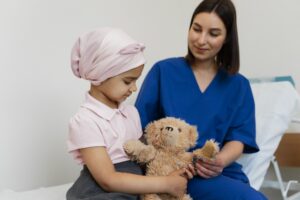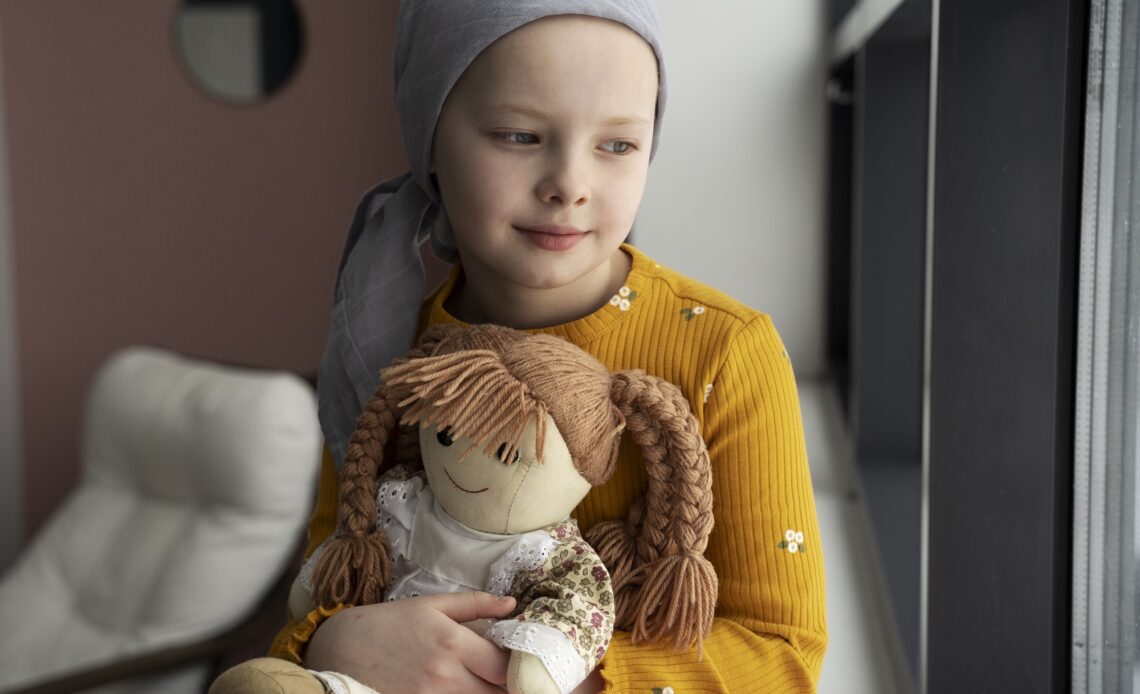When a child is diagnosed with cancer, it profoundly impacts not only the young patient but also their entire family. Navigating the emotional, physical, and financial challenges of childhood cancer requires a strong support system and comprehensive care. Supporting young patients and their families involves addressing the medical needs of the child while also providing emotional and psychological support to everyone involved. This blog explores the unique challenges faced by children with cancer and their families, highlighting strategies and resources that can help them cope and find strength during this difficult journey.
Understanding Childhood Cancer: Types, Causes, and Prevalence
Cancer is a devastating disease that can affect individuals of all ages, including children. While the causes of childhood cancer are not always fully understood, researchers have identified several factors that can contribute to its development. Genetic predisposition, environmental exposures, and certain medical conditions can all increase the risk of cancer in young patients.
The most common types of childhood cancer include leukemia, brain and spinal cord tumors, lymphoma, and solid tumors such as neuroblastoma and Wilms’ tumor. Each type of cancer requires specialized medical care and treatment, and the prognosis can vary greatly depending on the stage of the disease, the child’s age, and other individual factors.
The Impact of Childhood Cancer on Patients and Their Families
Receiving a cancer diagnosis is a life-changing event for any individual, but the impact is especially profound when the patient is a child. Young cancer patients often face a range of physical, emotional, and social challenges that can significantly disrupt their normal development and quality of life.

The treatment process for childhood cancer can be long and grueling, involving a combination of chemotherapy, radiation therapy, and sometimes surgery. These treatments can cause a wide range of side effects, including fatigue, nausea, hair loss, and changes in physical appearance. The physical toll of the disease and its treatment can be particularly difficult for children, who may struggle to maintain their energy levels, engage in physical activities, and attend school regularly.
In addition to the physical impacts, childhood cancer can also have a significant emotional and psychological impact on young patients. The fear, uncertainty, and disruption to their daily lives can lead to feelings of anxiety, depression, and social isolation. Children may also struggle with the loss of independence and control over their own lives, as they become increasingly dependent on their caregivers and healthcare providers.
Importance of Emotional Support for Young Cancer Patients
Providing emotional support for children with cancer is crucial to their overall well-being and recovery. Young patients often require specialized counseling and therapy to help them cope with the emotional and psychological challenges they face.
One of the key aspects of emotional support for children with cancer is the creation of a supportive and nurturing environment. This can involve the use of play therapy, art therapy, and music therapy, which can help children express their feelings, reduce stress, and maintain a sense of normalcy in their lives.
In addition to these therapeutic interventions, children with cancer may also benefit from the support of their peers. Support groups and peer-to-peer programs can help young patients feel less isolated and provide them with a sense of community and understanding. These programs can also help children develop coping strategies and resilience in the face of their illness.
Providing Practical Support for Families of Children with Cancer
Caring for a child with cancer is a significant burden, both emotionally and financially, for families. In addition to the emotional toll of the diagnosis and treatment, families may also face practical challenges, such as navigating the healthcare system, managing medical expenses, and balancing work and caregiving responsibilities.
One of the most important ways to support families of children with cancer is by providing access to resources and information. This can include connecting families with social workers, financial assistance programs, and support organizations that can help them navigate the complex medical and social services landscape.

Families may also benefit from practical assistance, such as transportation to and from medical appointments, meal preparation, and childcare for siblings. These types of support can help alleviate the burden on caregivers and allow them to focus on their child’s well-being.
Resources for Education and Information on Childhood Cancer
Families of children with cancer often have a significant need for information and education about the disease, its treatment, and its impact on the child and the family. Providing access to reliable and up-to-date resources can help families make informed decisions and better understand the challenges they are facing.
One of the key resources for families of children with cancer is the National Cancer Institute (NCI), which provides a wealth of information on childhood cancer types, treatments, and support services. The NCI website also features a directory of cancer centers and research institutions that specialize in pediatric oncology.
In addition to the NCI, there are numerous other organizations and foundations that offer educational resources and support for families of children with cancer. These include the American Childhood Cancer Organization, the Leukemia & Lymphoma Society, and the Children’s Oncology Group, among others. These organizations provide information on topics such as clinical trials, financial assistance, and psychosocial support.
Coping Strategies for Parents and Siblings of Young Cancer Patients
The impact of childhood cancer extends beyond the young patient, affecting the entire family unit. Parents and siblings of children with cancer often experience significant emotional and psychological stress as they navigate the challenges of the disease and its treatment.
For parents, coping with a child’s cancer diagnosis can be overwhelming, leading to feelings of anxiety, depression, and guilt. It is important for parents to prioritize their own self-care and seek support from mental health professionals, support groups, and other resources.
Siblings of children with cancer may also struggle with a range of emotions, including jealousy, resentment, and fear. It is crucial to provide siblings with age-appropriate information about the disease and its treatment, as well as opportunities to express their feelings and receive emotional support.

Strategies for coping with the stress of childhood cancer can include practicing mindfulness and relaxation techniques, engaging in physical activity, and seeking out counseling or support groups. Families may also benefit from respite care services, which can provide temporary relief from caregiving responsibilities.
The Role of Healthcare Professionals in Supporting Children with Cancer
Healthcare professionals, including physicians, nurses, and social workers, play a critical role in supporting children with cancer and their families throughout the treatment process.
Oncologists and pediatric specialists are responsible for providing comprehensive medical care, including diagnosis, treatment planning, and ongoing monitoring. They must work closely with the family to ensure that the child’s physical and emotional needs are being met, and that the family has a clear understanding of the treatment plan and its potential side effects.
Nurses and other healthcare staff are often the primary points of contact for families, providing emotional support, practical assistance, and educational resources. They may also coordinate the child’s care, liaise with other healthcare providers, and advocate for the family’s needs within the healthcare system.
Social workers and counselors can provide additional support to families, helping them navigate the complex social and financial challenges that often accompany a childhood cancer diagnosis. This may include connecting families with support services, assisting with insurance and financial matters, and providing referrals for mental health and counseling services.
Fundraising and Advocacy Efforts for Pediatric Cancer Research
Despite the significant progress that has been made in the treatment of childhood cancer, there is still much work to be done to improve outcomes and quality of life for young patients. Fundraising and advocacy efforts are crucial to supporting ongoing research and development in pediatric oncology.
One of the key ways that individuals and organizations can support pediatric cancer research is through fundraising initiatives. This may include organizing charity events, participating in sponsored walks or runs, or making direct donations to research institutions and foundations.
In addition to fundraising, advocacy efforts are also essential to raising awareness and driving policy change in support of children with cancer. This may involve lobbying policymakers, engaging with the media, and collaborating with other organizations to advocate for increased funding, improved access to care, and better support services for young patients and their families.
By supporting pediatric cancer research and advocacy efforts, individuals and communities can play a vital role in improving the lives of children with cancer and their families. Through these collective efforts, we can work towards a future where childhood cancer is no longer a devastating and life-altering diagnosis, but a treatable and manageable condition.
Conclusion
Childhood cancer is a complex and challenging disease that requires a comprehensive and multifaceted approach to support and care. From specialized medical treatment to emotional and practical support for families, the needs of young cancer patients and their loved ones are diverse and ever-evolving.
By promoting greater awareness and understanding of childhood cancer, we can help to destigmatize the disease and ensure that children and their families have access to the resources and support they need to navigate this difficult journey. This may involve engaging in advocacy efforts, supporting fundraising initiatives, and collaborating with healthcare providers and support organizations to develop and implement effective support programs.
Ultimately, our collective efforts to support children with cancer and their families can make a profound difference in their lives, helping to alleviate the physical, emotional, and social burdens of the disease and paving the way for a brighter future. By working together, we can create a world where children with cancer are not only survivors, but thriving individuals who are empowered to pursue their dreams and live their best lives.


